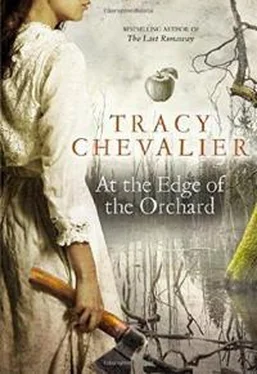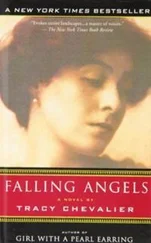Molly gave a shout when she saw him, ran over as he dismounted and hugged him, laughing, then pressed his face to her bosom. It sagged a little now but still smelled like bread. “Why do you look so surprised?” she cried when she’d let him come up for air. “I told you I’d get to Californie.”
“You-are you prospecting?” he asked. It was hard to imagine Molly as a miner. And finding gold was harder now; most of what was left required extraction with heavy equipment and cooperation rather than one man with a pick, a shovel and a pan. Many miners had joined together into companies. The rest had turned reluctantly and headed back east, or stayed and become sailors or ranchers or farmers or merchants or pimps or whores or hustlers. California had once been a huge land with a few Indians and Californios living there; now it held hundreds of thousands of Americans, come for gold and looking for something else to replace that dream.
“Me a miner?” Molly laughed. “You think I’m gonna get these hands dirty? Naw, I’m cookin’ at one of the camps up French Creek, off the Cosumnes River south of Hang Town. You know it? I jest come to Sacramento for supplies. Miners don’t want to spend a minute away from their work, so they pay me good money to feed ’em. I’m keepin’ an eye out for which one’s found the most gold and managin’ to hold on to his money. That’s the one I’ll stick with. Ain’t found him yet.”
She’s a cat, Robert thought, landing on her feet. He was glad to hear she had work and a plan, and had avoided the gold fever that took over so many and ravaged them. But he was a little uneasy too: he thought he’d seen a flash of desperation behind Molly’s cheerfulness when she first caught sight of him, more pronounced than the simple pleasure of running into someone she knew. It was not easy for a woman in California, there being so few of them, and so many volatile men, but Robert preferred to think that Molly could take care of herself. He did not want her to want something from him.
“So how about you, honey? You prospectin’?”
“I did for a while, but I’m not now.”
“Didn’t think so. You sure don’t look like you struck rich. No watch, no new boots. And your horse…” Molly made a face at the speckled gray. “What happened to Bolt?”
“Indians took him.”
She chuckled. “Shame. They got a good eye for horses. What, they left you this flea-biter, did they?”
The gray seemed to understand her, for he jerked his head and whinnied.
Robert explained that he’d left prospecting and begun collecting trees for William Lobb to send back to England. Molly stared at him. “What do they want with our trees? Don’t they have their own?”
Robert shrugged. “They don’t have so many pines there.”
“You put ’em on a ship goin’ thousands of miles and they pay good money for ’em?”
Robert nodded.
“That’s the silliest damned thing I ever heard.”
Robert smiled. It was a common response when he told people what he did. “You ever hear of Calaveras Grove, sixty miles south of here?”
“Heard of it. Never been. There’s a hotel up that way, ain’t there?”
“Yes, and trees bigger than anything you could ever imagine. Think of the biggest tree you’ve ever seen-”
“An old pecan tree, back of my Pa’s cabin in Georgia,” Molly said immediately. “I used to sit at the bottom of it and jest look up and up. I loved that tree.” For just a moment she dropped her cheery mask and became pensive.
“Take that pecan and triple it in size, both how tall and how wide. That’s a sequoia.”
“Well, now, I’d like to see that. Maybe I’ll go to Calaveras Grove and see those trees.” She sounded like she had back in Texas when talking about California. They exchanged a few more words about people they’d both known in Texas and what had become of them. The men had finished loading the flour and were waiting for Molly, picking their teeth and spitting tobacco on the ground around the wagon.
“Well, good luck with your seed collecting, Robert Goodenough,” Molly said at last. “I can see trees suit you better’n cattle ever did.”
“I guess.”
“Come and see me if you’re ever up near French Creek.”
“Are you still making those biscuits?” Molly’s biscuits in Texas had been famous for their fluffiness.
“Of course.” Molly winked. “Remember, the first one is free.”
Robert had thought he would never get to French Creek and take up her invitation. There were no redwoods or sequoias there, only some sugar and ponderosa pines he could collect but which he could also find just as easily closer to San Francisco. There was no reason to go. Nonetheless, three weeks later he made the trip. Molly was so glad to see him that he knew then the flash of desperation he’d noticed in Sacramento had not been imagined. Indeed, it was in her eyes when he arrived and when he left. In between she kept him near her, brought him into her bed and had him take her over and over until he had slaked his pent-up energy. When they were not in bed he helped her cook, for he had no desire to mine or watch others do so.
Being at French Creek reminded Robert of the prospecting fields he had left three years before: the relentless focus on gold that made men both crazed and dull, and the many nights around fires spent talking about the minutiae of equipment-whether a rocker box caught more gold than an individual pan, or where to buy a balanced pickaxe-or endlessly analyzing the latest rumors of gold elsewhere that could empty out a camp by morning. He hadn’t liked it then, even when he took part in it, and he detested it now, when the gold was harder to find. The miners still working were more ruthless, even when they were meant to be cooperating.
They treated Molly far worse than had the Texas cowboys, who had been grateful to her for her food and her bed and her cheerfulness. The miners only cared about gold: how big the nuggets, how abundant the flakes, how easily they could find it. They were never satisfied with what they got, and always worried that they had missed the bigger nugget, the better claim. Anything that stood in the way of their search, even things they needed-food, sleep, sex-was at best dispatched with quickly. At worst, they turned violent, taking out on these necessities all their frustration at not discovering the gold that would cure their fever. They threw meat at Molly’s feet if it was too tough, spat weak whiskey in her face, swore at her. Yet she put up with it, watchful, waiting for the man most likely to allow her to live with her feet up as she wanted. She worked, and took men to bed, and was beaten, and waited.
Her bedroom at least was comfortable. Molly always knew how to make a nest for herself, with a thick mattress, a pillow filled with duck feathers, good sheets, and fringed shawls and painted screens for decoration. She took baths often, and kept out of the rain and harsh sun. She also had a knack for doing as little as possible without seeming lazy, getting others to help her with a smile or a tease. Robert doubted she had ever lifted anything heavier than a five-pound sack of cornmeal. She managed to get the seat closest to the fire without seeming greedy or ashamed to take it. Nor did she walk far, but wheedled lifts, either on horseback or, preferably, in a wagon, where she sat back and surveyed the land around her with the entitled air of a queen. It made the miners’ ill treatment of her all the harder to bear. While he was there he brought her coffee in bed each morning, as if to make up for the other men’s cruelty. He knew how to make only a crude version with burnt beans he’d hammered and boiled, but Molly acted gladder than she need be for this small gesture.
Читать дальше







![Трейси Шевалье - Тонкая нить [Литрес]](/books/386177/trejsi-shevale-tonkaya-nit-litres-thumb.webp)




